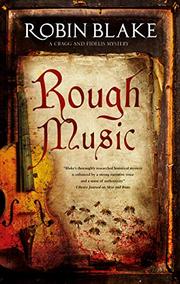
A coroner with a philosophical bent and a physician with advanced
views face some vexing 18th-century puzzles.
As everyone around him in 1744 Lancashire worries about a
possible new uprising in Scotland, County Coroner Titus Cragg can think only of
protecting his baby from an outbreak of paralyzing fever. Upon the suggestion
of his friend and colleague Dr. Luke Fidelis, he, his wife, Elizabeth, and baby
Hector move to the village of Accrington, deep in the country and rarely
visited by outsiders. They rent a small Dower House from Squire Thomas Turvey,
a widower who lives with his invalid daughter, Thomasina, and is obsessed with
bees. Their reception by the townsfolk is strangely cold until they learn of a
recent incident in which shrewish Mrs. Gargrave drowned in a mud puddle after
her rough treatment by a local mob re-enacting an ancient ritual. Cragg
arranges an inquest and sends for Fidelis to view the body. Many joined in, but
the event seemed to be instigated by Harry Hawk, who returned from his army
service with his face so disfigured that Mrs. Gargrave suggested he was an
imposter even though his wife accepted him. The bucolic village is far from
peaceful. Turvey, who’s fired Hawk as his assistant beekeeper, is quarreling
with Mr. Horntree of Hatchfly Hall over a swarm of bees. Cragg and Fidelis find
Horntree’s beautiful and unhappy wife at the estate gatehouse, ill and possibly
injured, before they’re thrown out by her wrathful husband. The jury in the
Gargrave case fights verbally and then physically before tendering a verdict of
death by cause unknown. After Mrs. Horntree runs away and seeks help from Cragg
and Fidelis but is taken in by Turvey, Cragg, acting as a referee for a violent
annual contest, finds that Mrs. Horntree is not the lady she appears.
Blake’s (Skin and Bone, 2016, etc.) highly original
mystery with a masterly denouement is made all the more absorbing by the
skillfully wrought historical background.







Add comment